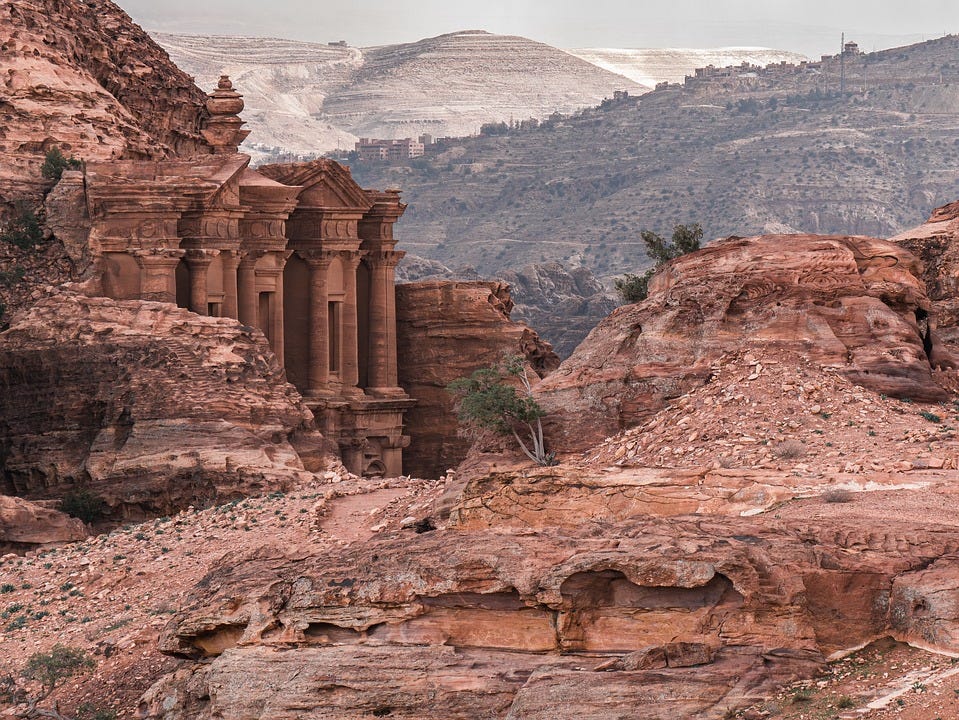Brief Ruminations: Edom as a paradigm for the nations
What symbolism might be present in the Bible's use of Edom?
In the short but powerful book of Obadiah, the prophet relays a prophecy from God against Edom, the nation descended from Esau, for aiding Babylon in destroying Israel. The focus is clearly on Edom, yet in verse 16 something interesting happens:
For as you have drunk on my holy mountain, so all the nations shall drink continually; they shall drink and swallow, and shall be as though they had never been. (Obad 1:16)
1Momentarily, it seems the point of the oracle against Edom is that God will defeat all the nations in the same manner as Edom. Is this the only time this happens in scripture?
Ezekiel prophesies in a similar context and, in a reference to all foreign nations, mentions Edom alone by name:
Thus says the Lord GOD to the mountains and the hills, the ravines and the valleys, the desolate wastes and the deserted cities, which have become a prey and derision to the rest of the nations all around, therefore thus says the Lord GOD: Surely I have spoken in my hot jealousy against the rest of the nations and against all Edom, who gave my land to themselves as a possession with wholehearted joy and utter contempt, that they might make its pasturelands a prey. (Ezek 36:4-5)
Another interesting occurrence of Edom as a pattern for the other nations is found in Amos:
“In that day I will raise up the booth of David that is fallen and repair its breaches, and raise up its ruins and rebuild it as in the days of old, that they may possess the remnant of Edom and all the nations who are called by my name,”declares the LORD who does this. (Amos 9:11-12)
Edom specifically is associated here with the restoration of Israel, but all nations will be possessed by God and His people in the same manner. This passage comes up in an important moment in the New Testament, when the young church is struggling to understand its new identity as a people of God now including Gentiles in full:
After they finished speaking, James replied, “Brothers, listen to me. Simeon has related how God first visited the Gentiles, to take from them a people for his name. And with this the words of the prophets agree, just as it is written,
‘After this I will return, and I will rebuild the tent of David that has fallen; I will rebuild its ruins, and I will restore it, that the remnant of mankind may seek the Lord, and all the Gentiles who are called by my name, says the Lord, who makes these things known from of old.’” (Acts 15:13-18)
In keeping with the Septuagint, “the remnant of Edom” becomes “the remnant of mankind” (in other words, Edom becomes adam) and the fate of Edom is once again a pattern for the fate of all nations. Now, though, the remnant of Edom consists of Gentiles who have turned to Christ and share in the inheritance given to Israel, God's second-born “firstborn son.”2
Lastly, Edom is used to represent the nations in a subtle way in Revelation. In one of the theophanies of the divine warrior, God—specifically Jesus—appears ready to destroy the nations once and for all and is described by John with a peculiar reference:
He is clothed in a robe dipped in blood, and the name by which he is called is The Word of God. (Revelation 19:13)
As is typical of John’s Revelation, there are ties to the Old Testament. I believe John has in mind another theophonic passage where God appeared as a divine warrior wrapped in garments dripping blood:
Who is this who comes from Edom, in crimsoned garments from Bozrah, he who is splendid in his apparel, marching in the greatness of his strength? “It is I, speaking in righteousness, mighty to save.”Why is your apparel red, and your garments like his who treads in the winepress?“I have trodden the winepress alone, and from the peoples no one was with me; I trod them in my anger and trampled them in my wrath; their lifeblood spattered on my garments, and stained all my apparel. For the day of vengeance was in my heart, and my year of redemption had come. I looked, but there was no one to help; I was appalled, but there was no one to uphold; so my own arm brought me salvation, and my wrath upheld me. I trampled down the peoples in my anger; I made them drunk in my wrath, and I poured out their lifeblood on the earth.” (Isa 63:1-6)
Where Isaiah spoke of a God destroying (and saving!) Edom, John speaks of a God ready to destroy and rule over all nations.3
Why might the Bible use Edom in such a way? I think it has something to do with the perennial motif of the elder and younger brother in the Bible, but I’m not sure about specifics. What do you think?
Biblical quotations are in ESV unless otherwise noted.
Exod 4:22.
Rev 19:11-16, cf. Psa 82:8.




